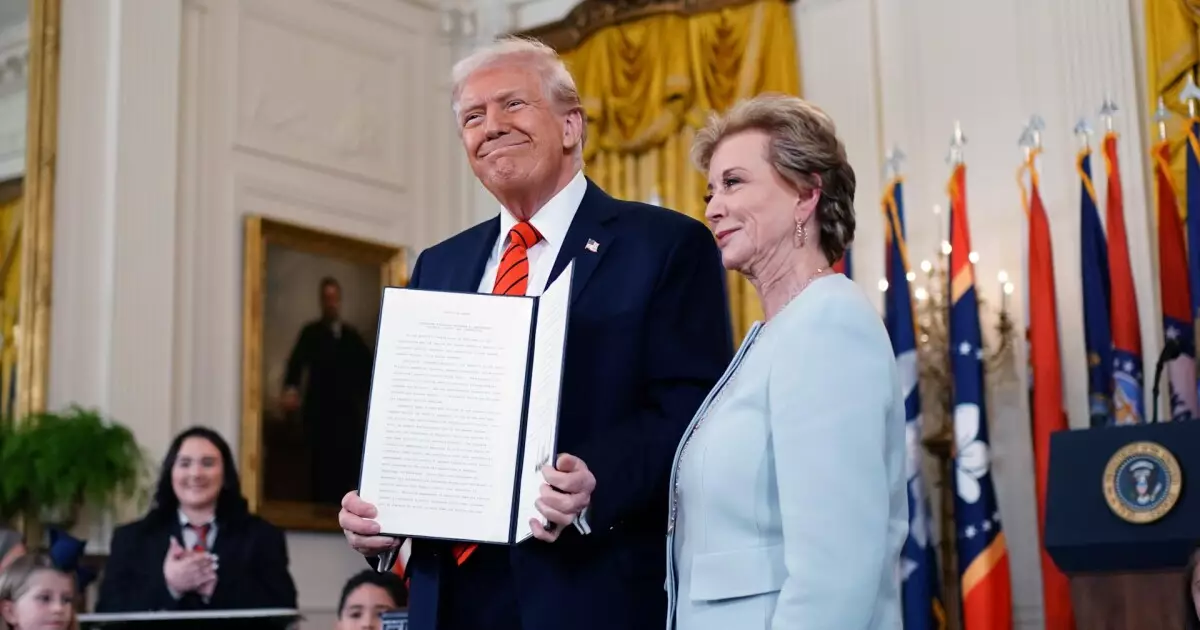The unfolding battle over educational funding paints a grim picture of the priorities governing our schools. The recent lawsuit led by California and New York, along with 14 other states and the District of Columbia, highlights a shocking reality: the Trump administration has put political ideology above the future of American children. This lawsuit specifically challenges the abrupt rescission of federal funds aimed at alleviating pandemic-induced learning losses, a move that Attorney General Rob Bonta succinctly termed as “blatant disregard for the education” we owe our youth. Such stark language underscores the seriousness of this issue; we aren’t merely talking about numbers or budgets—we are talking about the foundational structure of education that shapes the future.
Despite our society’s insistence on the importance of education, the Trump administration has taken action that jeopardizes the very fabric of academic success. This deep-seated clash of ideals comes through in every exchange—one side advocating for the free flow of crucial funds essential for recovery, the other seemingly willing to sacrifice our children’s education on the altar of fiscal austerity and narrow political aspirations.
Cutting Funds, Cutting Futures
The lawsuit raises significant legal questions about whether the U.S. Department of Education has violated the Administrative Procedure Act. By reversing its previous stance on the allocation of COVID-19 relief grants, the administration has not only contradicted itself but also left states scrambling. In a shocking disregard for the process, Education Secretary Linda McMahon announced that schools would no longer have access to critical funds meant for essential services like after-school programs, educational technology, and mental health services. The ramifications of such a decision extend beyond immediate financial loss; they indicate a troubling trend towards centralized authority that undervalues the input of state leaders and local school districts.
In numerical challenges to this funding decision, California alone stands to lose $200 million, while New York faces a loss of $134 million. These aren’t merely figures on a spreadsheet; these funds are lifelines for numerous programs designed to address the detrimental impacts of the pandemic on our children’s education. The cuts risk perpetuating a cycle of academic decline, primarily impacting the most vulnerable sectors of our population.
The Broader Implications of Educational Cuts
This seismic shift in policy isn’t just an isolated series of decisions; it reflects a broader ideological assault on public education itself. The Trump administration’s push to dismantle critical components of the Department of Education, including attempts that have seen nearly half of its staff laid off, smacks of an anti-educational plutocracy. Education underpins opportunity; losing access to these funds threatens to institutionalize inequality and constrain individual potential. It raises an urgent question: at what cost will we allow this administration to persist in dismantling the safeguards that ensure equitable access to education for all children?
As education professionals and advocates raise alarms over the pending court case, the focus shifts to the fundamental needs of our children. While the lawsuit may legally contest the actions of the Education Secretary, it also calls for a reevaluation of our collective societal values. Shouldn’t the foundation of our nation prioritize the education and development of children, rather than succumbing to political brinkmanship that serves narrow interests?
Unity Against Misplaced Priorities
In an unprecedented show of unity, 16 states have rallied together to fight for what is right. The bipartisan coalition of attorneys general underscores an essential truth: when it comes to our children’s future, all political divisions must take a back seat. Education is a shared responsibility, and it should transcend party lines.
However, it would be disingenuous to ignore the motivations behind such stark actions. The coordinated resistance by states highlights a deeper issue: a government that prioritizes ideology over practical governance. The imminent need for educational funds signifies a failure to grasp the core principle that education is not merely a political discourse but the bedrock of our society. As we observe this legal struggle unfold, we must consider the long-term implications for our schools and, ultimately, the very future of our nation.
It’s clear that the Biden administration must take heed of this pressing demand for restoration—restoration not just of funding, but of faith in a system that should uplift, not deter, the academic prospects of our children. In this ongoing saga, it becomes evident that the battle for educational equity is far larger than the individual lawsuits—it’s a fight for the very soul of democratic, public education.

